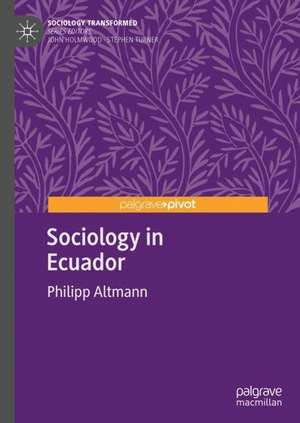Sociology in Ecuador: Sociology Transformed
Autor Philipp Altmannen Limba Engleză Hardback – 25 noi 2022
Din seria Sociology Transformed
-
 Preț: 383.93 lei
Preț: 383.93 lei -
 Preț: 383.93 lei
Preț: 383.93 lei -
 Preț: 381.98 lei
Preț: 381.98 lei -
 Preț: 382.75 lei
Preț: 382.75 lei -
 Preț: 384.31 lei
Preț: 384.31 lei -
 Preț: 381.59 lei
Preț: 381.59 lei -
 Preț: 382.36 lei
Preț: 382.36 lei -
 Preț: 382.57 lei
Preț: 382.57 lei -
 Preț: 385.62 lei
Preț: 385.62 lei -
 Preț: 418.83 lei
Preț: 418.83 lei -
 Preț: 419.43 lei
Preț: 419.43 lei -
 Preț: 385.25 lei
Preț: 385.25 lei -
 Preț: 451.48 lei
Preț: 451.48 lei -
 Preț: 385.62 lei
Preț: 385.62 lei -
 Preț: 383.33 lei
Preț: 383.33 lei -
 Preț: 382.36 lei
Preț: 382.36 lei -
 Preț: 416.54 lei
Preț: 416.54 lei -
 Preț: 385.25 lei
Preț: 385.25 lei -
 Preț: 237.37 lei
Preț: 237.37 lei -
 Preț: 347.04 lei
Preț: 347.04 lei -
 Preț: 349.91 lei
Preț: 349.91 lei -
 Preț: 354.54 lei
Preț: 354.54 lei -
 Preț: 315.95 lei
Preț: 315.95 lei -
 Preț: 343.00 lei
Preț: 343.00 lei -
 Preț: 382.75 lei
Preț: 382.75 lei -
 Preț: 450.88 lei
Preț: 450.88 lei -
 Preț: 483.92 lei
Preț: 483.92 lei -

-

-

Preț: 352.41 lei
Nou
Puncte Express: 529
Preț estimativ în valută:
67.45€ • 70.15$ • 56.52£
67.45€ • 70.15$ • 56.52£
Carte tipărită la comandă
Livrare economică 14-28 martie
Preluare comenzi: 021 569.72.76
Specificații
ISBN-13: 9783031144288
ISBN-10: 3031144287
Pagini: 164
Ilustrații: VI, 164 p.
Dimensiuni: 148 x 210 mm
Greutate: 0.36 kg
Ediția:1st ed. 2022
Editura: Springer International Publishing
Colecția Palgrave Macmillan
Seria Sociology Transformed
Locul publicării:Cham, Switzerland
ISBN-10: 3031144287
Pagini: 164
Ilustrații: VI, 164 p.
Dimensiuni: 148 x 210 mm
Greutate: 0.36 kg
Ediția:1st ed. 2022
Editura: Springer International Publishing
Colecția Palgrave Macmillan
Seria Sociology Transformed
Locul publicării:Cham, Switzerland
Cuprins
1. Introduction.- 2. The first sociology in Ecuador.- 3. The failed attempt to modernize sociology from the 1940s.- 4. Critical Sociology.- 5. Conclusions.
Notă biografică
Philipp Altmann is Professor Titular for Sociological Theory at the Universidad Central del Ecuador. He works on how ideas spread, on the intersection of discourse analysis, history of concepts, and sociology of knowledge.
Textul de pe ultima copertă
This Palgrave Pivot presents a concise yet comprehensive history of sociology in Ecuador. The case of Ecuador is especially interesting, as Ecuadorian sociology oscillated between theoretical debates—some of them out of time—and a constant search for ways of applying them to the local reality. In the decades after its formal creation in 1915, early academic sociology in Ecuador worked creatively with already outdated theories around positivism and organicism to understand the indigenous population's position, the regional fragmentation, and the formation of a coherent nation-state in Ecuador. After a short attempt of installing a more technical sociology in the 1960s, those topics were taken up and re-read by Marxist-inspired critical sociology after the 1970s, leading to the nation-wide institutionalization of one particular tradition that could connect to continental debates. This book engages with several relevant debates in social sciences and humanities, particularly by adding tothe thriving research on social sciences and the role of the university and higher education in Latin America. Furthermore, it touches some recently influential topics in sociology: Ecuadorian sociology can be read as Southern Theory or engaged with from a postcolonial or decolonial perspective; the research on how ideas travel, are diffused or localized is vital for understanding sociology in Ecuador; the relation between academia and politics; and more.
Philipp Altmann is Professor Titular for Sociological Theory at the Universidad Central del Ecuador. He works on how ideas spread, on the intersection of discourse analysis, history of concepts, and sociology of knowledge.
Caracteristici
Presents the first comprehensive history of academic sociology in Ecuador Lends insights into the development of the social sciences in the Global South Engages with debates on Southern Theory, Eurocentrism, translation and localization of ideas, and institutionalism
